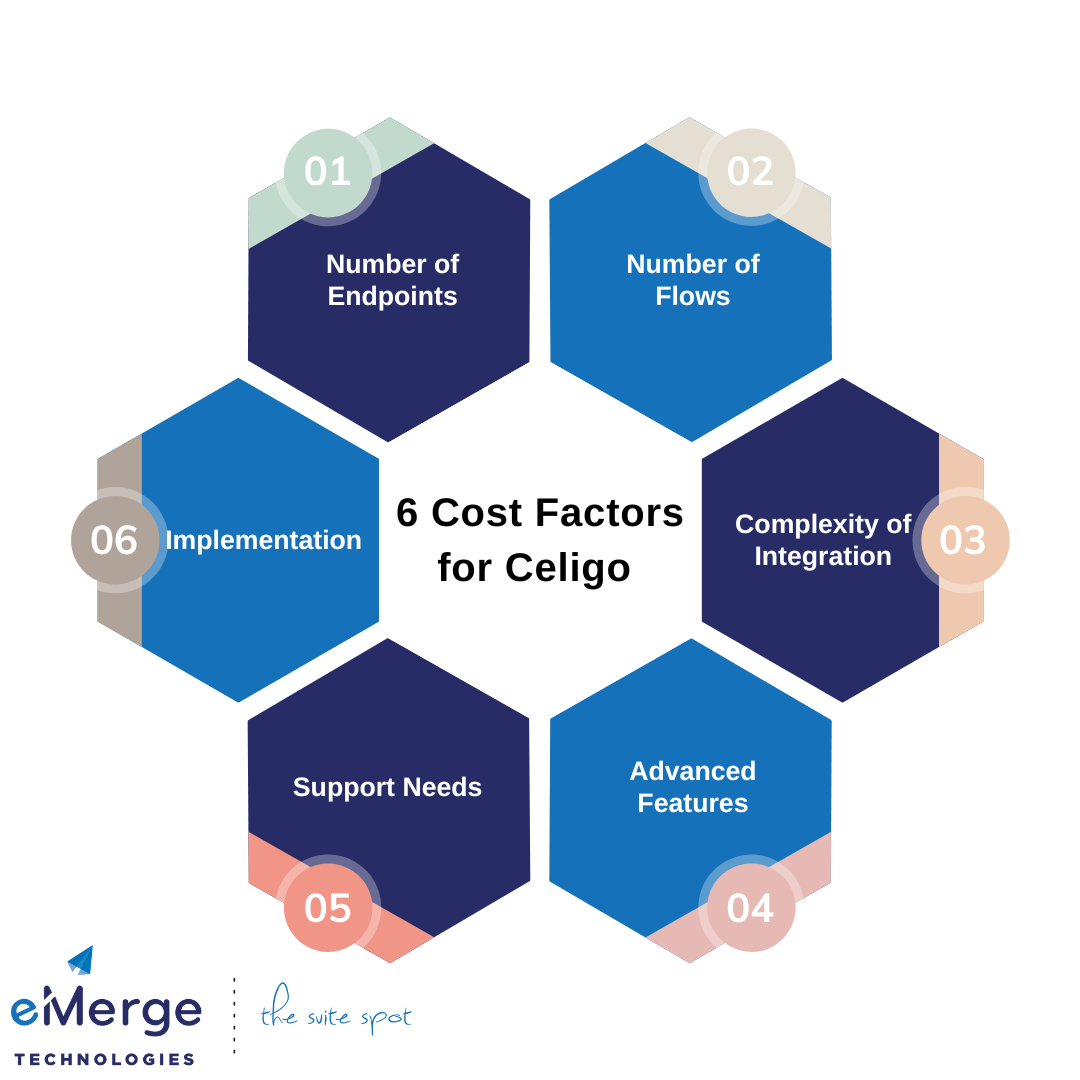- CALL : (+1) 407-273-1001
- Main Office : (+1) 407-273-1001
- Celigo Integration NetSuite Integration
- Dec 21
- 7 mins read
Celigo Pricing Demystified: Licensing Options in 2023
Celigo Pricing Explained
When it comes to choosing the right integration solution for your business, the cost is often a major consideration. Celigo is a leading provider of integration solutions, offering a range of products and pricing plans to meet the needs of businesses of all sizes and industries.
There are a number of factors that can affect the cost of using Celigo’s integration solutions, including the specific product or plan you choose, the complexity of your integration needs, and the volume of data you need to process.
In this article, we’ll take a closer look at Celigo’s pricing plans, and the features, and capabilities included in each option.
Meet an Integration ExpertGet Integration Quote
Celigo.io Platform Overview
Celigo’s flagship offering is its platform, Celio.io. Celigo.io is a cloud-based, powerful suite of enterprise integration tools that allows users to connect and integrate various applications and data sources. It provides a range of tools and features for building, managing, and automating integrations between different systems.
Some of the features of Celigo.io include:
- Pre-built integrations for popular applications such as Salesforce, NetSuite, and Shopify
- Custom integrations using a drag-and-drop interface and a library of connectors and templates
- Real-time data synchronization and scheduling options for integration tasks
- Error handling and reporting tools
- API management and security features
Celigo Licensing
Before we discuss how Celigo is priced, it’s important to understand how Celigo is licensed. The Celigo.io platform is sold in 4 Editions:
Standard: A good way to get started with the Celigo platform. The Standard Edition comes with 3 Endpoints and 16 flows, Essential Support, and API Management.
Professional: For businesses that are starting to embrace digital transformation in a big way. The Professional Edition comes with 5 Endpoints, 100 Flows, Preferred Support Plan, API management, and a Sandbox account included.
Premium: For businesses that have fully embraced digital transformation. The Premium Edition comes with 10 Endpoints, unlimited flows, Premier Support, API management, a Sandbox, SSO support, and an external FTP site.
Enterprise: For large businesses who want to integrate every department and process. The Enterprise Edition comes with 20 Endpoints, unlimited flows, Premier Support, API management, a Sandbox, SSO support, and 2 external FTP sites.
If you do not understand what some of these words mean, such as “flows”, “Endpoints”, or what is included in the different support plans, please continue reading.
Celigo Cost Factors

Now that you know the manners in which Celigo can be licensed, we can start to understand the factors that dictate how much Celigo will cost. The answers to the questions below will determine which type of Celigo product you will need and what you can expect to pay for it every month.
Meet an Integration ExpertGet Integration Quote
Number of “Endpoints”
In the context of Celigo, an endpoint refers to a specific application or system that you want to connect to and integrate with using the Celigo platform. An endpoint can be a software application, a database, a cloud service, or any other system that you want to connect to in order to exchange data or automate processes.
In the Celigo platform, you can create integrations by connecting two or more endpoints together. For example, you might want to connect your customer relationship management (CRM) system to your e-commerce platform in order to automatically sync customer data between the two systems. In this case, the CRM system and the e-commerce platform would be considered endpoints.
Number of “Flows”
In the context of Celigo, a flow refers to a specific integration that has been set up using the Celigo platform. A flow typically involves connecting two or more endpoints together in order to exchange data or automate processes between them.
Going back to our previous example, you might create a flow that connects your CRM system to your e-commerce platform in order to automatically sync customer data between the two systems. This flow would specify the data that needs to be exchanged and the conditions under which the data should be synced.
Complexity of Integration
There are several complexities that can make a Celigo integration more expensive, including:
Customization: If you need to customize the integration to meet specific business needs or requirements, this can increase the cost.
Data mapping: If you need to map data between systems in a complex way, this can be time-consuming and increase the cost.
Multiple systems: If you need to integrate multiple systems, this can be more complex and increase the cost.
Large volume of data: Integrating systems with a large volume of data can be more complex and increase the cost.
API integration: If you need to integrate with APIs, this can be more complex and increase the cost.
Security: If you have strict security requirements, this can increase the complexity of the integration and the cost.
Advanced Features
There are several advanced features that are available with certain Celigo pricing plans and can increase the cost of the platform. Some of these features include:
Data Mapping: This feature allows you to map data between different systems in order to ensure that the data is properly formatted and structured when it is exchanged.
API Management: This feature allows you to manage and monitor API integrations, including creating and testing APIs, setting up API security, and monitoring API performance.
Custom Connectors: This feature allows you to create custom connectors to connect to systems or APIs that are not supported by the Celigo platform out of the box.
Advanced Error Handling: This feature allows you to set up advanced error handling and recovery for your integrations, including retries, error notifications, and error logs.
Advanced Scheduling: This feature allows you to set up advanced scheduling options for your integrations, including scheduling by frequency, time of day, and specific dates.
Advanced Reporting: This feature allows you to access advanced reporting and analytics tools to monitor the performance of your integrations and identify any issues.
Celigo Support Pricing
Celigo offers three support plans: Essential, Preferred, and Premier. The main differences between these plans are the level of support and the features and tools that are included. Here is a brief overview of each plan:
Essential: The Essential support plan is the most basic option, and it includes self-service support and access to a variety of resources and tools to help you set up and manage your integrations. With this plan, you can also contact the celigo support team via email for help with any issues or questions you have. This plan is included for free with your subscription.
Preferred: The Preferred support plan includes all of the features and tools of the Essential plan, as well as phone support and a faster response time for email support. This plan is a good option for organizations that need a higher level of support but don’t need all of the advanced features and tools of the Premier plan. This plan is priced at 20% of your product subscription.
Premier: The Premier support plan is the most comprehensive option, and it includes all of the features and tools of the Essential and Preferred plans, as well as advanced support options such as priority response times, dedicated support staff, and access to advanced tools and resources. This plan is a good option for organizations that need a high level of support and advanced features and tools to manage their integrations. This plan is priced at 30% of your product subscription.
For more information on these plans, Click Here.
Implementation
Implementing a Celigo solution involves a number of steps, including:
- Identifying the specific integration or automation needs of the organization and how a Celigo solution can help meet those needs.
- Planning the implementation project, including setting goals, timelines, and budgets, and determining the resources and infrastructure needed.
- Purchasing and installing the necessary software licenses or subscription plans.
- Setting up and configuring the integration or automation solution, including connecting to the relevant systems and data sources and defining the specific integration or automation rules and processes.
- Testing and debugging the solution to ensure that it is working as intended.
- Training employees on how to use and maintain the solution.
- Going live with the solution and continuously monitoring and updating it to ensure that it remains effective and efficient over time.
As you can see, implementing a Celigo solution requires a significant investment of time and resources, and it is important for organizations to carefully plan and account for these costs before going ahead with a purchase. Working with a trusted partner or provider can help organizations navigate the implementation process and maximize the benefits of the Celigo solution.
Meet an Integration ExpertGet Integration Quote
Celigo FAQ
- Q: How much does Integrator io cost?
A: The pricing for Integrator.io depends on the specific integration needs of the user, such as the number of integrations, frequency of data transfer, and data volume. They offer a variety of pricing plans, including a free plan, a pay-as-you-go plan, and custom enterprise plans. - Q: Is Celigo a NetSuite partner?
A: Yes, Celigo is a NetSuite partner and offers a range of integrations that connect NetSuite with other applications such as Salesforce, Shopify, and Amazon. Celigo has achieved the NetSuite Built for NetSuite certification, which ensures that their integrations are built to meet NetSuite’s standards for security, performance, and compatibility. - Q: What is Celigo used for?
A: Celigo is an integration platform that allows users to connect various applications and systems to automate workflows and improve business processes. Celigo offers pre-built integrations for popular business applications such as NetSuite, Salesforce, Shopify, and Amazon, as well as the ability to create custom integrations. Some common use cases for Celigo include e-commerce automation, order management, and financial management. - Q: Is Celigo an iPaaS?
A: Yes, Celigo is an iPaaS, which stands for Integration Platform as a Service. iPaaS refers to a cloud-based platform that enables users to build, deploy, and manage integrations between different applications and systems. Celigo offers a range of features and tools that make it easy to create and manage integrations, such as a drag-and-drop integration builder and pre-built integration templates. - Q: Is Celigo cloud-based?
A: Yes, Celigo is a cloud-based integration platform that allows users to create and manage integrations between cloud-based applications and systems. Celigo is hosted on the cloud, which means that users can access the platform from anywhere with an internet connection and do not need to install any software on their local machines. - Q: Is Celigo an EDI?
A: Yes, Celigo offers EDI (Electronic Data Interchange) capabilities as part of its integration platform. EDI is a method of exchanging business documents electronically, such as purchase orders and invoices, between different companies. Celigo’s EDI integration allows users to automate the exchange of EDI documents with their trading partners, improving efficiency and reducing manual errors.
Final Thoughts
In conclusion, Celigo pricing is determined by a variety of factors including the number of integrations, the complexity of the integrations, and the level of support needed. While it may seem like a daunting task to determine the right pricing plan for your organization, it is important to carefully consider all of these factors in order to choose a solution that meets your needs and budget.
If you have any specific questions about the Celigo solution, or if you need help determining which plan is right for you, don’t hesitate to reach out to us at eMerge Technologies. Our team of experts is here to help you navigate the world of integrations and find the right solution for your business.
Finally, to learn more about the Celigo platform in general, please check out our post the Complete Celigo Guide.
Jeremy McCourt is an content producer in the enterprise software industry that focuses on NetSuite and related cloud-based software solutions.
Related Posts

What is Dell Boomi? The 2023 Guide to a Leading IPaas
Contact us! eMerge Technologies has been creating integrations with the NetSuite platform for the past 15 years. And in that period, we have watched a number of innovations come on the market that makes integrations…
- Jan 06
- 5 mins read

NetSuite API 101: The 2023 Complete Guide
NetSuite API 101 Welcome to “NetSuite API 101: Demystifying the Power of the NetSuite API”! If you’re new to NetSuite or just starting to explore the possibilities of the API, this article is for you….
- Dec 23
- 8 mins read
